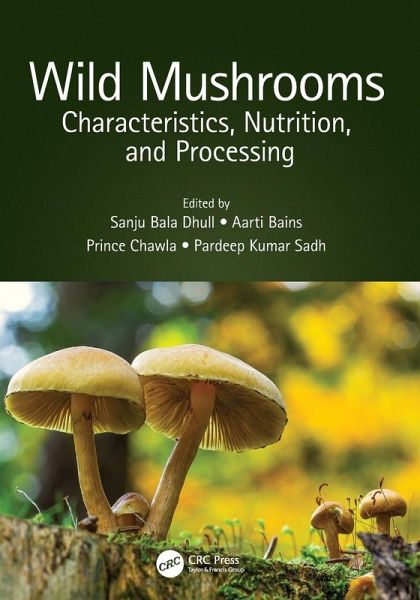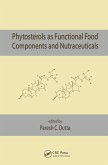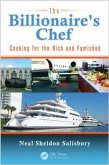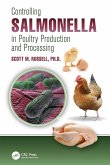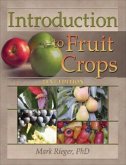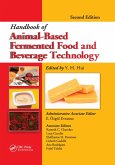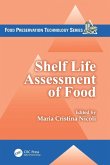Wild Mushrooms
Characteristics, Nutrition, and Processing
Herausgeber: Dhull, Sanju Bala; Sadh, Pardeep Kumar; Chawla, Prince; Bains, Aarti
Wild Mushrooms
Characteristics, Nutrition, and Processing
Herausgeber: Dhull, Sanju Bala; Sadh, Pardeep Kumar; Chawla, Prince; Bains, Aarti
- Broschiertes Buch
- Merkliste
- Auf die Merkliste
- Bewerten Bewerten
- Teilen
- Produkt teilen
- Produkterinnerung
- Produkterinnerung
This book informs readers about different unexplored wild mushrooms, their methods of cultivation, nutritional values, pharmaceutical values, and possible utilization for human wellbeing.
Andere Kunden interessierten sich auch für
![Phytosterols as Functional Food Components and Nutraceuticals Phytosterols as Functional Food Components and Nutraceuticals]() Phytosterols as Functional Food Components and Nutraceuticals81,99 €
Phytosterols as Functional Food Components and Nutraceuticals81,99 €![The Billionaire's Chef The Billionaire's Chef]() Neal SalisburyThe Billionaire's Chef67,99 €
Neal SalisburyThe Billionaire's Chef67,99 €![Clostridium Botulinum Clostridium Botulinum]() HauschildClostridium Botulinum83,99 €
HauschildClostridium Botulinum83,99 €![Controlling Salmonella in Poultry Production and Processing Controlling Salmonella in Poultry Production and Processing]() Scott M Russell Ph DControlling Salmonella in Poultry Production and Processing96,99 €
Scott M Russell Ph DControlling Salmonella in Poultry Production and Processing96,99 €![Introduction to Fruit Crops Introduction to Fruit Crops]() Mark RiegerIntroduction to Fruit Crops120,99 €
Mark RiegerIntroduction to Fruit Crops120,99 €![Handbook of Animal-Based Fermented Food and Beverage Technology Handbook of Animal-Based Fermented Food and Beverage Technology]() Handbook of Animal-Based Fermented Food and Beverage Technology83,99 €
Handbook of Animal-Based Fermented Food and Beverage Technology83,99 €![Shelf Life Assessment of Food Shelf Life Assessment of Food]() Shelf Life Assessment of Food130,99 €
Shelf Life Assessment of Food130,99 €-
-
-
This book informs readers about different unexplored wild mushrooms, their methods of cultivation, nutritional values, pharmaceutical values, and possible utilization for human wellbeing.
Hinweis: Dieser Artikel kann nur an eine deutsche Lieferadresse ausgeliefert werden.
Hinweis: Dieser Artikel kann nur an eine deutsche Lieferadresse ausgeliefert werden.
Produktdetails
- Produktdetails
- Verlag: CRC Press
- Seitenzahl: 528
- Erscheinungstermin: 7. Oktober 2024
- Englisch
- Abmessung: 254mm x 178mm x 28mm
- Gewicht: 934g
- ISBN-13: 9780367715564
- ISBN-10: 0367715562
- Artikelnr.: 71601889
- Herstellerkennzeichnung
- Libri GmbH
- Europaallee 1
- 36244 Bad Hersfeld
- gpsr@libri.de
- Verlag: CRC Press
- Seitenzahl: 528
- Erscheinungstermin: 7. Oktober 2024
- Englisch
- Abmessung: 254mm x 178mm x 28mm
- Gewicht: 934g
- ISBN-13: 9780367715564
- ISBN-10: 0367715562
- Artikelnr.: 71601889
- Herstellerkennzeichnung
- Libri GmbH
- Europaallee 1
- 36244 Bad Hersfeld
- gpsr@libri.de
Dr. Sanju Bala Dhull Sanju Bala Dhull, Ph.D., is presently working as Associate Professor in Department of Food Science and Technology, Chaudhary Devi Lal University, Sirsa, having more than 14 years of teaching and research experience. Her area of interests includes synthesis and characterization of biomolecules, nanoparticles, nanoemulsions and antimicrobial activity of nanoformulations in food and characterization of biomolecules. She has published more than 40 research papers, 2 book and 15 book chapters in books of national and international repute. She presented more than 20 research paper in various national and international conferences. She is an active member of Association of Food Scientists and Technologists (India) and Association of Microbiologists of India. She also serves as reviewer of several national and international journals. Dr. Aarti Bains Dr. Bains is presently working as Assistant professor in Microbiology, (Department of Biotechnology), CT Institute of Pharmaceutical Sciences, South Campus, Jalandhar, Punjab. She is M.Sc. in Microbiology from Himachal Pradesh University and completed her Mphil, Ph.D. in Microbiology from Shoolini University, Solan. Her area of interest includes the extraction and identification of bioactive compounds from wild edible mushrooms and their biological activity. She has published 18 research and review articles and 4 international book chapters. She has research and teaching experience of eight years and has guided 7 master's students. She is a reviewer of several national and international journals. Dr. Prince Chawla Dr. Chawla joined Lovely Professional University, Phagwara, Punjab as Assistant professor in Food Technology and Nutrition (School of Agriculture). Dr. Chawla is an alumnus of Chaudhary Devi Lal University, Sirsa, and Shoolini University, Solan. Dr. Chawla has a chief interest in mineral fortification, functional foods, protein modification, and the detection of adulterants from foods using nanotechnology. He has worked in the 'Department of Biotechnology' and 'Department of Science and Technology" funded research projects and has 8 years of research experience. He has 3 patents, 2 books, 44 international research papers, 7 international book chapters. Dr. Chawla is guiding 4 Ph.D. students and guided 11 M.Sc. students. He is a recognized reviewer of more than 30 international journals and reviewed several research and review articles. Dr. Pardeep Kumar Sadh Dr. Sadh is is currently working as Assistant Professor in Biotechnology, Chaudhary Devi Lal University, Sirsa, Haryana, India. He did his MSc, M.Phil, and Ph.D., from the Department of Biotechnology, Chaudhary Devi Lal University, Sirsa, Haryana, India. He has published more than 25 national and international research articles and 3 book chapters with international and national publishers. His area of interest for research includes protein engineering, structural analysis using various techniques, bioresource technology, functional foods, food biotechnology, and agricultural waste management. He was a recipient of the Rajiv Gandhi National Fellowship during his Ph.D. from University Grant Commission under the Government of India. He has been awarded for best poster awards in various conferences and certificates of excellence for reviewing international reputed journals. He is the referee and recognized reviewer of several international and national journals.
An introduction to wild mushrooms and their exploitation for human well
being. Cultivation strategies of edible and medicinal mushrooms.
Preservation and processing technology of wild mushrooms. Edible mushrooms
commercialization: Nutraceuticals and dietary supplement formulation.
Mushroom ingestion for mineral supplementation. Edible mushrooms: a source
of quality proteins. Health benefits of edible mushrooms. Nature and
chemistry of bioactive components of wild edible mushrooms. In-vitro and
In-vivo bioactivity of edible mushrooms. Oxidative stress: Possible
mechanism of oxidative stress and cellular longevity by edible mushrooms.
Qualitative and quantitative techniques of analysis of mushrooms.Toxic
component and toxicology of wild mushrooms. Effect of food processing
condition on bioactivity and nutritional components of edible mushrooms.
Extracellular enzymes of wild mushrooms. Application of mushrooms in the
degradation of xenobiotic components and the reduction of pesticides.
Utilization of wild mushrooms in waste management. Cultivation of wild
mushroom using lignocellulosic biomass-based residue as a substrate.
being. Cultivation strategies of edible and medicinal mushrooms.
Preservation and processing technology of wild mushrooms. Edible mushrooms
commercialization: Nutraceuticals and dietary supplement formulation.
Mushroom ingestion for mineral supplementation. Edible mushrooms: a source
of quality proteins. Health benefits of edible mushrooms. Nature and
chemistry of bioactive components of wild edible mushrooms. In-vitro and
In-vivo bioactivity of edible mushrooms. Oxidative stress: Possible
mechanism of oxidative stress and cellular longevity by edible mushrooms.
Qualitative and quantitative techniques of analysis of mushrooms.Toxic
component and toxicology of wild mushrooms. Effect of food processing
condition on bioactivity and nutritional components of edible mushrooms.
Extracellular enzymes of wild mushrooms. Application of mushrooms in the
degradation of xenobiotic components and the reduction of pesticides.
Utilization of wild mushrooms in waste management. Cultivation of wild
mushroom using lignocellulosic biomass-based residue as a substrate.
An introduction to wild mushrooms and their exploitation for human well
being. Cultivation strategies of edible and medicinal mushrooms.
Preservation and processing technology of wild mushrooms. Edible mushrooms
commercialization: Nutraceuticals and dietary supplement formulation.
Mushroom ingestion for mineral supplementation. Edible mushrooms: a source
of quality proteins. Health benefits of edible mushrooms. Nature and
chemistry of bioactive components of wild edible mushrooms. In-vitro and
In-vivo bioactivity of edible mushrooms. Oxidative stress: Possible
mechanism of oxidative stress and cellular longevity by edible mushrooms.
Qualitative and quantitative techniques of analysis of mushrooms.Toxic
component and toxicology of wild mushrooms. Effect of food processing
condition on bioactivity and nutritional components of edible mushrooms.
Extracellular enzymes of wild mushrooms. Application of mushrooms in the
degradation of xenobiotic components and the reduction of pesticides.
Utilization of wild mushrooms in waste management. Cultivation of wild
mushroom using lignocellulosic biomass-based residue as a substrate.
being. Cultivation strategies of edible and medicinal mushrooms.
Preservation and processing technology of wild mushrooms. Edible mushrooms
commercialization: Nutraceuticals and dietary supplement formulation.
Mushroom ingestion for mineral supplementation. Edible mushrooms: a source
of quality proteins. Health benefits of edible mushrooms. Nature and
chemistry of bioactive components of wild edible mushrooms. In-vitro and
In-vivo bioactivity of edible mushrooms. Oxidative stress: Possible
mechanism of oxidative stress and cellular longevity by edible mushrooms.
Qualitative and quantitative techniques of analysis of mushrooms.Toxic
component and toxicology of wild mushrooms. Effect of food processing
condition on bioactivity and nutritional components of edible mushrooms.
Extracellular enzymes of wild mushrooms. Application of mushrooms in the
degradation of xenobiotic components and the reduction of pesticides.
Utilization of wild mushrooms in waste management. Cultivation of wild
mushroom using lignocellulosic biomass-based residue as a substrate.

